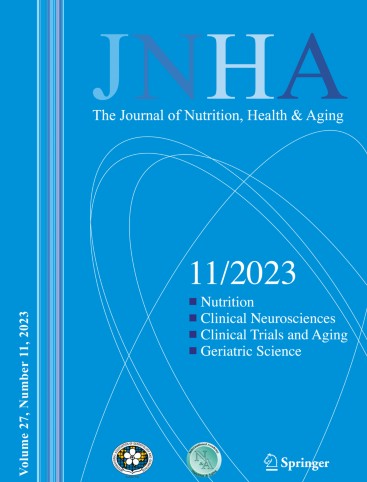社区老年人每日补充富含蛋白质的乳素汤和肌肉健康:一项随机对照试验。
IF 4.3
3区 医学
Q1 GERIATRICS & GERONTOLOGY
引用次数: 0
摘要
背景:饮食中蛋白质的充足性对老年人的肌肉健康至关重要,这对素食老年人提出了特别的挑战。这项随机对照试验(RCT)研究了补充富含蛋白质的乳素汤对老年人身体成分、身体表现和肌肉力量功能评估以及心脏代谢和炎症生物标志物的影响。方法:在这项随机对照试验中,我们招募了100名年龄≥65岁、营养不良风险(MNA-SF≤11)和肌肉减少风险(SARC-F≥4或SARC-CalF≥11)的参与者。参与者被随机分配接受每日富含蛋白质的乳素汤(24-30克蛋白质)或正常饮食。主要研究结果包括(1)身体组成(人体测量和生物阻抗分析(BIA)测量的身体组成),(2)身体表现(短物理性能电池,SPPB)和肌肉力量(握力),(3)在基线和随访第12周时评估功能评估(包括肌肉减少症风险量表和营养状况)以及次要结局(包括心脏代谢和炎症生物标志物)。结果:对97名参与者(干预组48名,对照组49名)的资料进行分析。尽管干预组的身体组成没有显著变化,但与常规饮食相比,接受富含蛋白质的乳素汤补充的人的身体表现有所改善,包括SPPB评分增加(β = 0.83 [95% CI 0.15-1.51], p = 0.02),完成5次椅子上升测试的时间减少(β = -2.25[-4.04至-0.44],p = 0.01)。还观察了一些功能评估,包括改善的肌肉减少症风险量表(例如,SARC-F评分[β = -0.68, p = 0.04])和营养状况(例如,MNA-SF评分[β = 0.44, p = 0.03])。结论:每天补充富含蛋白质的乳素汤可以提高有营养不良和肌肉减少风险的老年人的身体机能和功能评估(如肌肉减少风险量表和营养状况)。需要进一步的研究来探索富含蛋白质的乳素汤补充剂对健康衰老的长期益处。本文章由计算机程序翻译,如有差异,请以英文原文为准。
Daily Supplementation with Protein-Enriched Lacto-Vegetarian Soups and Muscle Health in Community-Dwelling Older Adults: A Randomized Controlled Trial
Background
Dietary protein adequacy is crucial for muscle health in aging individuals, posing a particular challenge for vegetarian seniors. This randomized controlled trial (RCT) investigates the impacts of protein-enriched lacto-vegetarian soup supplementation on body composition, physical performance and muscle strength functional assessment as well as cardiometabolic and inflammatory biomarkers in older adults.
Methods
We enrolled 100 participants ≥65 years at risk for malnutrition (MNA-SF ≤ 11) and at risk for sarcopenia (SARC-F ≥4 or SARC-CalF ≥11) in this RCT. Participants were randomized assigned to receive a daily protein-enriched lacto-vegetarian soup (24−30 g protein) or usual diet. Primary outcomes of interest including (1) body composition (anthropometric measurements and body composition measured by bioimpedance analysis (BIA)), (2) physical performance (Short Physical Performance Battery, SPPB) and muscle strength (hand grip strength), and (3) functional assessments (including sarcopenia risk scales and nutritional status) as well as secondary outcomes of interests including cardiometabolic and inflammatory biomarkers were assessed at baseline and the 12th week of follow-up.
Results
Data of 97 participants (intervention: n = 48, control: n = 49) were analyzed. Despite no significant changes in body composition were observed in the intervention group, compared to the usual diet, those who received protein-enriched lacto-vegetarian soup supplementation had an improved physical performance including an increase in SPPB score (β = 0.83 [95% CI 0.15–1.51], p = 0.02), a decrease in time to complete the 5 times chair rise test (β = −2.25 [−4.04 to −0.44], p = 0.01). Some functional assessments, including improved sarcopenia risk scale (e.g., SARC-F score [β = −0.68, p = 0.04]) and nutritional status (e.g., MNA-SF score [β = 0.44, p = 0.03]) were also observed.
Conclusions
Daily supplementation with protein-enriched lacto-vegetarian soups enhanced physical performance and functional assessments (such as sarcopenia risk scale and nutritional status) among older adults at risk of malnutrition and sarcopenia. Further study is needed to explore the long-term benefits of protein-enriched lacto-vegetarian soup supplementation for healthy aging.
求助全文
通过发布文献求助,成功后即可免费获取论文全文。
去求助
来源期刊
CiteScore
7.80
自引率
3.40%
发文量
136
审稿时长
4-8 weeks
期刊介绍:
There is increasing scientific and clinical interest in the interactions of nutrition and health as part of the aging process. This interest is due to the important role that nutrition plays throughout the life span. This role affects the growth and development of the body during childhood, affects the risk of acute and chronic diseases, the maintenance of physiological processes and the biological process of aging. A major aim of "The Journal of Nutrition, Health & Aging" is to contribute to the improvement of knowledge regarding the relationships between nutrition and the aging process from birth to old age.

 求助内容:
求助内容: 应助结果提醒方式:
应助结果提醒方式:


